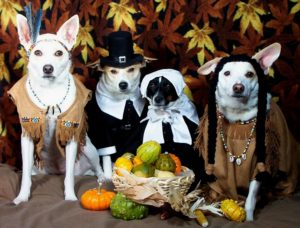By Dr. Beth Leermakers
In many homes, the holiday eating marathon kicks off soon, if it hasn’t already. When your dog gazes longingly at your plate with that sad, hungry look, you may be tempted to slip her a treat under the table. After all, what harm could it do to share a few leftovers? As my friend discovered the hard way one Thanksgiving, feeding your dog too much turkey and stuffing can lead to an expensive emergency vet clinic bill.

The high-calorie, high-fat foods that we enjoy at holidays — and throughout the year — are harmful to our pets. Just one generous portion of a high-fat meal can take its toll on your dog. Here are five health problems that may occur if your dog eats too many table scraps:
Pancreatitis. Pancreatitis, caused by eating too many fatty foods, can be fatal in dogs. The pancreas produces the hormone insulin and manufactures digestive enzymes. Pancreatitis develops when the organ becomes inflamed. In dogs, acute pancreatitis is often caused by eating an atypical, high-fat meal.
The inflamed pancreas starts to leak digestive enzymes that are irritating and start to break down any tissue they encounter. The enzymes don’t break down the intestinal tract, where they’re supposed to be secreted, because the intestines are covered with mucous and other protective mechanisms. Inflammation causes enzyme leakage that in turn increases inflammation, creating a vicious cycle. The digestive enzymes can leak into the abdominal cavity, damaging adjacent structures and other organs, like the liver, bile ducts, gall bladder and intestines.
Depending on the severity of the condition, pancreatitis symptoms may include poor appetite, lethargy, fever, severe abdominal pain, vomiting and diarrhea. Many dogs that have a single acute episode of pancreatitis (after over-indulging at the kids’ table) recover without any lasting ill effects. However, in more severe cases, one episode of pancreatitis may be fatal or become a chronic and/or recurrent problem.
Gastrointestinal (GI) Upset. Some dogs’ digestive systems can’t handle new foods. New foods can disrupt the balance of your pet’s gastrointestinal linings and flora, causing inflammation in the GI tract. Symptoms of GI upset look like those of pancreatitis: loss of appetite, stomachaches, vomiting, diarrhea and lethargy. No, it’s not just the tryptophan in the turkey making your dog sleepy. If your dog displays any of these symptoms, take her to your vet right away.
Ingestion of toxic substances. Some “people” foods are toxic to dogs: raisins, grapes, chocolate, onions, mushrooms and xylitol (a sugar substitute often found in gum and candies). Raisins and grapes can cause kidney toxicity in pets, and xylitol causes extremely low blood sugar that can lead to death.
GI obstruction. Bones, peach pits and other foods can block your dog’s intestines. GI blockage symptoms are the same ones seen in pancreatitis and GI upset: vomiting, diarrhea, lethargy and loss of appetite. Bottom line: if your dog is throwing up or has diarrhea after eating a high-fat meal, you’d better head to your vet’s office or emergency clinic.
Your vet may be able to induce vomiting, but that may not be the right treatment. Your dog may need X-rays or an abdominal ultrasound to determine what’s blocking his intestines.
My senior dog, Betty White, had an abdominal mass that the vet thought was a cancerous tumor — until he opened her up and found a rope toy/hair ball lodged in her intestine — possibly for years. Recommended treatments of a foreign body obstruction include surgical removal or aggressive fluid therapy.
Bone splinters. Cooked bones can be very dangerous for pets. Chicken and turkey bones are particularly harmful, but beef and pork bones can also hurt your dog. Cooking bones dries them, making them more likely to splinter and get stuck in your dog’s mouth, throat, stomach or even the walls of his intestines. Larger bone fragments may become wedged in your dog’s small bowel, causing discomfort, since food can’t pass through the narrow passageway. Internal bone fragments may need to be surgically removed.
To keep your dog safe this holiday season and throughout the year, err on the side of caution and feed your dog only treats and food that are specially formulated for the canine digestive system.
